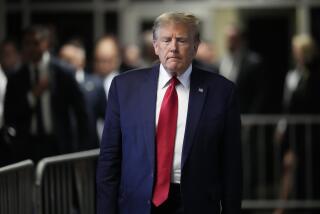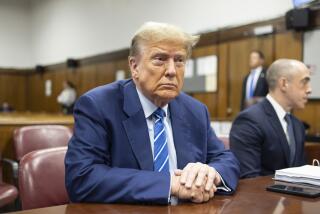San Diego judge approves $25 million Trump University settlement
SAN DIEGO — A San Diego federal judge on Friday morning finalized the $25 million settlement in the Trump University litigation, dismissing the objection of a Florida woman and finding in favor of the 3,700 others who stand to recoup the vast majority of what they spent on the real estate baron’s investment program.
The ruling ends six years of litigation that got nasty from the start — including an early countersuit by Donald Trump that failed — and became political fodder in his race for the White House.
The written ruling from U.S. District Judge Gonzalo Curiel still leaves open the possibility of an appeal, which could tie up the three class-action lawsuits — and the settlement funds — for years to come.
A day earlier, a New York attorney representing Sherri B. Simpson, the lone class member who filed an official objection to the settlement, argued to the judge that she should not be bound by the agreement.
Gary Friedman said the 2015 notice sent to potential class members clearly stated that participants would be able to opt out of the lawsuit at a later date in case of a settlement and preserve their right to sue Trump individually — a step Simpson wants to take.
“She just wants her day in court,” Friedman said outside the courthouse Thursday, adding that Simpson wants to try to win a verdict against Trump that would triple her award.
Lawyers for the plaintiffs disagreed, saying the language in the notice when read in the correct context stated that participants could only opt out of receiving a portion of the settlement, not leave the case entirely.
Curiel wrote in his decision that the language in the 2015 notice was clear as to her options, with the preamble to one section “unequivocally” stating: “You have to decide whether to stay in the Classes or ask to be excluded before the trial, and you have to decide this now.”
The judge added that Simpson had plenty of opportunity earlier to opt out of the case and file her own lawsuit, and could have even requested to leave the case after the opt out deadline had passed. The judge allowed a few other class members to do so at the time.
“She chose not to do so, and cannot now belatedly argue that due process compels a further opt-out opportunity,” Curiel said.
His final approval allows more than 3,700 class members who were part of the two lawsuits filed in San Diego to recover an estimated 90 percent of what they spent on Trump University, attorneys said. The exact amount is still being calculated as claims are verified. Roughly 7,000 class members were initially eligible for recovering a portion of the settlement, but many did not file claims by the March 6 deadline.
The New York Attorney General’s Office, which filed the third lawsuit and was awarded $4 million of the settlement, has offered to give $1.6 million to the students in the San Diego cases.
The judge called the award amount “exceptional” and commended the plaintiffs lawyers for agreeing to take the case pro bono to maximize the return for their clients.
“We spent thousands of days fighting for thousands of victims, and we are grateful to see this result approved by the Court,” one of the plaintiffs lawyers, Rachel Jensen of Robbins Geller Rudman & Dowd, said in a statement Friday.
Curiel also approved an incentive award of $15,000 each for the five class representatives whose names were on the San Diego cases: Sonny Low, John Brown, J.R. Everett and former plaintiff Tarla Makaeff in one case, and Art Cohen in the other.
“I never dreamed we’d be able to return over 90 percent of the money students around the country spent on this school,” Cohen said in a statement. “It’s unheard of and I couldn’t be happier.”
The lawsuits, kicked off by Makaeff in 2010, claimed Trump University used unsavory sales tactics and made false promises to persuade students to sign up for seminars, the ultimate goal to solicit memberships to the “Gold Elite” program for $35,000. The yearlong membership promised a personal mentor and exclusive access to Trump’s real estate resources.
Trump zealously denied the claims, arguing the program was valuable and blaming the students for their own shortcomings. He repeatedly promised to fight the lawsuits at trial.
Days after he won the presidency in November, just as both sides were prepared to begin the first trial, the case settled with no admission of liability or wrongdoing by Trump or Trump University. Trump said in tweets that he needed to focus on transitioning to the White House but boasted he still would have prevailed at trial.
kristina.davis@sduniontribune.com
Twitter: @kristinadavis
UPDATES:
11:30 a.m.: This article was updated with additional details.
This article was originally published at 9:30 a.m.
More to Read
Inside the business of entertainment
The Wide Shot brings you news, analysis and insights on everything from streaming wars to production — and what it all means for the future.
You may occasionally receive promotional content from the Los Angeles Times.











